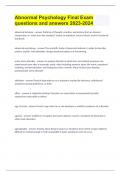Abnormal Psychology Final Exam questions and answers 2023-2024
abnormal behavior - answer Patterns of thought, emotion, and actions that are deviant, unexpected, or "away from the standard" based on statistical, social-cultural, and/or functional standards.
abnormal psychology - answer The scientific study of abnormal behavior in order to describe, predict, explain, and ultimately change abnormal patterns of functioning.
acute stress disorder - answer An anxiety disorder in which fear and related symptoms are experienced soon after a traumatic event, often including amnesia about the event, emotional numbing, and derealization, and lasting less than a month. Many victims later develop posttraumatic stress disorder.
addiction - answer Physical dependence on a substance marked by tolerance, withdrawal symptoms during abstinence, or both.
affect - answer A subjective feeling of emotion or mood often accompanied by bodily expressions noticeable to others.
age of onset - answer Person's age when he or she develops or exhibits symptoms of a disorder.
agnosia - answer Inability to recognize and name objects; may be a symptom of dementia or other brain disorders.
agoraphobia - answer Anxiety about being in places or situations from which escape might be difficult (or embarrassing) or help unavailable if panic symptoms were to occur. alogia - answer Deficiency in the amount or content of speech, a disturbance often seen in people with schizophrenia. Also known as poverty of speech.
alternate personalities / alters - answer In dissociative identity disorder, the additional identities
along with the host identity. Also known as subpersonalities.
American Law Institute (ALI) test (1955) - answer A legal test for insanity that holds a person to be insane at the time of committing a crime, if during criminal conduct, the individual could not judge right from wrong or control his or her behavior as required by law. Compare M'Naghten Rule and irresistible impulse.
amnestic disorders - answer Organic disorders in which the primary symptom is memory loss.
anhedonia - answer Inability to experience pleasure, associated with some mood and schizophrenic disorders.
anorexia nervosa - answer Eating disorder characterized by continual food refusal and the pursuit of extreme thinness, leading to dangerously low body weight.
antisocial personality disorder - answer A personality disorder marked by a pervasive pattern of disregard for and violation of the rights of others. Deceitful, unremorseful, manipulative, lacks anxiety and guilt.
anxiety - answer Mood state characterized by marked negative affect, behaviors, and bodily symptoms of tension in which a person apprehensively anticipates future danger or misfortune.
anxiety disorders - answer A varied group of disorders that all have anxiety, fear, or tension as an essential feature. Includes specific phobias, social phobia, panic disorder, generalized anxiety disorder, obsessive-compulsive disorder, and posttraumatic stress disorder. aphasia - answer Impairment or loss of language skills resulting from brain damage caused by stroke, Alzheimer's disease, or other illness or trauma.
apraxia - answer Loss of motor activities (such as walking); one of the symptoms of dementia.
Asperger's disorder - answer A pervasive developmental disorder in which individuals display profound social impairment and restricted or unusual behaviors, but without language delays seen in autism.
attention deficit / hyperactivity disorder (ADHD) - answer Developmental disorder in which persons are unable to focus their attention, they behave hyperactively or impulsively, or both.
auditory hallucinations - answer Psychotic disturbance in perception in which a person hears sounds or voices although these are not real or actually present. The voices are often critical, accusatory, or demanding.
attributional style - answer The relatively consistent explanations a person forms about why personal stressors or other negative life events occur, taking the form of internal vs. external, stable vs. unstable, and global vs. specific.
autistic disorder (autism) - answer Pervasive developmental disorder characterized by significant impairment in social interactions, extreme unresponsiveness to others, poor communication skills, and highly repetitive and rigid behavior.
avoidant personality disorder - answer A personality disorder featuring a pervasive pattern of social inhibition, feelings of inadequacy, and extremely sensitive to criticism.
avolition - answer A symptom of schizophrenia marked by apathy, and an inability to initiate or complete important activities.




